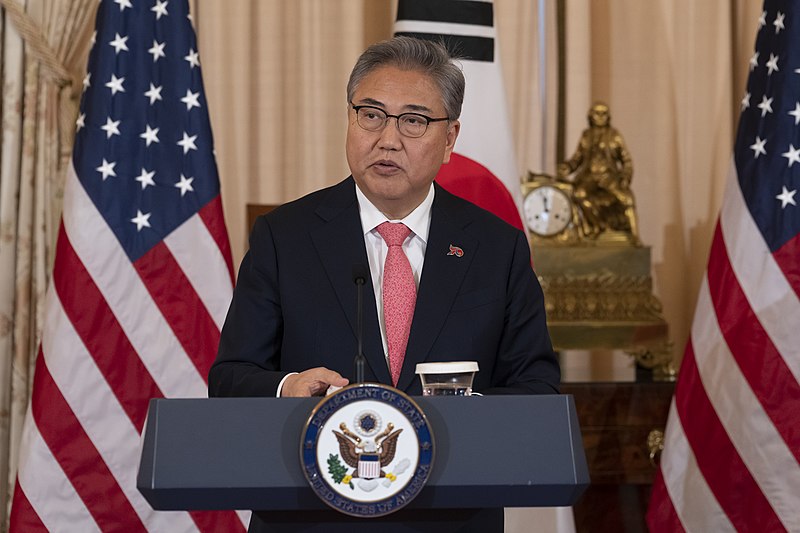South Korean foreign minister Park Jin touted the “extended deterrence” of the US and South Korea surrounding North Korea. This comes as South Korea has sought to receive assurances from Washington over extended deterrence in the midst of concerns over Pyongyang’s continuing development of its nuclear programs.
During a joint news conference following a meeting with the secretary of state Antony Blinken at the State Department in Washington, Park said South Korea and the United States would continue their “watertight coordination” in order to ensure peace in the Korean peninsula.
“We are committed to strengthening extended deterrence while maintaining a robust combined defense posture. Any provocations by North Korea will be met with a firm and united response,” said Park, whose meeting with Blinken follows a visit to Seoul by US defense secretary Lloyd Austin.
During the visit to South Korea, Austin pledged to expand military drills and boost nuclear deterrence planning to counter North Korea’s weapons development program and prevent an open military conflict from happening.
South Korea has also sought to hold talks with the US over its Inflation Reduction Act, which does not include electric vehicles made outside North America in the tax credits in the US.
“We will also work together to ensure that the Inflation Reduction Act is implemented in ways that address Korean companies’ concerns and benefit both our businesses and industries,” said Park, adding that Seoul will also explore potential cooperation with Washington under the CHIPS and Science Act, the US law that would boost semiconductor production in the country and research with a view to competition with China.
On Monday, the South Korean military said it spotted a North Korean balloon over its airspace but later determined that the balloon did not pose a threat. The balloon entered South Korean airspace on Sunday, according to the defense ministry in a statement, adding that it has taken “measures” regarding the balloon, which left the airspace hours later.
Officials believe that it was a weather balloon rather than a balloon intended for surveillance activities, according to South Korea’s Yonhap news agency, citing an official familiar with the matter.



 New York Legalizes Medical Aid in Dying for Terminally Ill Patients
New York Legalizes Medical Aid in Dying for Terminally Ill Patients  U.S. Announces Additional $6 Million in Humanitarian Aid to Cuba Amid Oil Sanctions and Fuel Shortages
U.S. Announces Additional $6 Million in Humanitarian Aid to Cuba Amid Oil Sanctions and Fuel Shortages  Trump Allows Commercial Fishing in Protected New England Waters
Trump Allows Commercial Fishing in Protected New England Waters  Nighttime Shelling Causes Serious Damage in Russia’s Belgorod Region Near Ukraine Border
Nighttime Shelling Causes Serious Damage in Russia’s Belgorod Region Near Ukraine Border  Trump Endorses Japan’s Sanae Takaichi Ahead of Crucial Election Amid Market and China Tensions
Trump Endorses Japan’s Sanae Takaichi Ahead of Crucial Election Amid Market and China Tensions  South Korea Assures U.S. on Trade Deal Commitments Amid Tariff Concerns
South Korea Assures U.S. on Trade Deal Commitments Amid Tariff Concerns  Ohio Man Indicted for Alleged Threat Against Vice President JD Vance, Faces Additional Federal Charges
Ohio Man Indicted for Alleged Threat Against Vice President JD Vance, Faces Additional Federal Charges  U.S. to Begin Paying UN Dues as Financial Crisis Spurs Push for Reforms
U.S. to Begin Paying UN Dues as Financial Crisis Spurs Push for Reforms  China Warns US Arms Sales to Taiwan Could Disrupt Trump’s Planned Visit
China Warns US Arms Sales to Taiwan Could Disrupt Trump’s Planned Visit  TrumpRx.gov Highlights GLP-1 Drug Discounts but Offers Limited Savings for Most Americans
TrumpRx.gov Highlights GLP-1 Drug Discounts but Offers Limited Savings for Most Americans  TrumpRx Website Launches to Offer Discounted Prescription Drugs for Cash-Paying Americans
TrumpRx Website Launches to Offer Discounted Prescription Drugs for Cash-Paying Americans  Japan Election 2026: Sanae Takaichi Poised for Landslide Win Despite Record Snowfall
Japan Election 2026: Sanae Takaichi Poised for Landslide Win Despite Record Snowfall  Trump Signs “America First Arms Transfer Strategy” to Prioritize U.S. Weapons Sales
Trump Signs “America First Arms Transfer Strategy” to Prioritize U.S. Weapons Sales  Missouri Judge Dismisses Lawsuit Challenging Starbucks’ Diversity and Inclusion Policies
Missouri Judge Dismisses Lawsuit Challenging Starbucks’ Diversity and Inclusion Policies  Trump Signs Executive Order Threatening 25% Tariffs on Countries Trading With Iran
Trump Signs Executive Order Threatening 25% Tariffs on Countries Trading With Iran  Netanyahu to Meet Trump in Washington as Iran Nuclear Talks Intensify
Netanyahu to Meet Trump in Washington as Iran Nuclear Talks Intensify  U.S.-India Trade Framework Signals Major Shift in Tariffs, Energy, and Supply Chains
U.S.-India Trade Framework Signals Major Shift in Tariffs, Energy, and Supply Chains 































